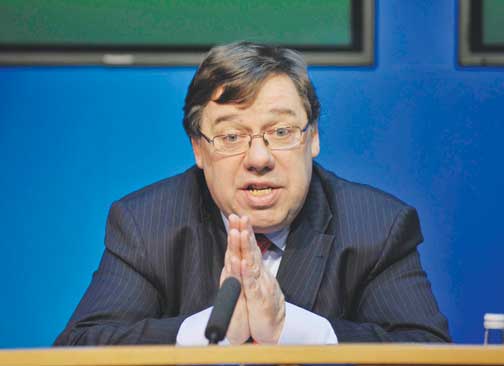


SERVICES
Tuesday November 30, 2010
Ireland Gets 85bn Euro Bailout
Taoiseach Brian Cowen, pictured at the press conference where he announced that the European Union has approved an 85 billion Euro rescue deal for Ireland (Photocall) Taoiseach Brian Cowen has described an €85 billion rescue package agreed for Ireland by the European Union and IMF as "the best available deal". Under the package agreed on Sunday night, €50 billion will used to cover the government's spending requirements over the next three years, and €35 billion to bail out the Irish banks. €10 billion will be immediately used to recapitalise the banks, and another €25 billion will be held in a contingency fund to be used as needed next year for further recapitalisation. The rate of interest to be charged will vary depending on how much money is drawn down by the government, and when, but will be about 5.8%. That is higher than the 5.2% rate which the Greeks were charged for their bailout earlier in the year. The government estimates that interest repayments on all State debt will account for 20 cent in every euro raised in tax revenues in 2014. The bailout fund will be financed from a number of different sources. Under the plan, Ireland itself will contribute €17.5 billion euro of the funding, with €12.5 billion coming from the National Pension Reserve Fund, and €5 billion from other cash reserves. The IMF will put €22.5 billion into the fund, with €45 billion coming from the EU, including direct bilateral loans from the UK, Sweden and Denmark, who do not have the euro as their currency. The deal is dependent on a program of reforms in three parts: the restructuring of the banks, the fiscal and structural reform, and growth enhancing reforms in the labour market. The bank restructuring will involve reducing the size of Ireland's banks, to make them more appropriate to a country of its size. The fiscal reform, will include bringing the budget deficit down to 3% of GDP in the coming years, through the implementation of the national recovery plan published earlier in the week (and outlined in detail elsewhere in this paper). The labour market reforms were described by one union leader as a euphemism for cutting the minimum wage, but they also includes social welfare measures. Ireland has been given an extra year in which to get is financial affairs in order, with the program extending the target date to 2015 in the event that growth is slower than expected. Ireland's low corporate tax rate of 12.5%, which some EU countries are eager to see changed, will remain in place and does not form any part of the agreement. The deal is subject to quarterly reviews - which means officials from the IMF and EU will be keeping a close eye on the implementation of austerity measures every three months. Taoiseach Brian Cowen said the deal gives Ireland "vital time and space" to address the unprecedented problems the economy faced. "Without this external support, the State would not be able to raise funds required to pay for key public services for our citizens and to provide a functioning banking system to support economic activity," he said. He insisted the deal represented good value, despite the high 5.8% interest rate. "These loans will provide money that we had already planned to borrow on the international markets. That funding will now be available to Ireland at a cheaper interest rate that if we'd borrowed on those markets," he added. The rate of interest had been the subject of touch negotiations. At 5.8%, it was lower than some had expected, but is still relatively high. Fine Gael finance spokesman Michael Noonan said he suspected that there was a sort of incentive built into setting a high rate, in the hope that Ireland would return to the bond markets sooner and not view the rescue deal as a means to access cheap money. Employers group IBEC described the interest rate as "very high", while union boss David Begg said it was penal and our European friends had "done us no favours" in that respect. Taoiseach Brian Cowen said he believed Ireland had few other options than to take the deal. He said there had been no political support for any move that would have seen senior bondholders take a hit and write down some of their debt. While it would have been politically popular in Ireland, there were fears that such a measure would spook markets and spread problems to other countries in the euro. He said leaving the euro was "not an option for this country", and ruled out defaulting saying "Ireland is a responsible country". The IMF's chief broker Ajai Chopra said the National Pension Reserve Fund element of the deal was "unique" in his experience of this type of negotiation. He said the fact Ireland had such a "cash buffer" was a sign of the underlying strength of the Irish economy. But the Labour Party's Joan Burton said the EU and IMF negotiators had "played better poker" than the Irish negotiators. She said the fact that Ireland's pension reserve fund was to be raided, meant we were being asked to put up front all the assets we have as a country. She said when the cash reserves were gone, "the trap has closed on Ireland and we are banjaxed", adding that the EU and IMF had Ireland "where they wanted us". The plan was endorsed by the finance ministers of all 27 EU states over the weekend, and its publication followed a week of intensive negotiations in Dublin between EU, IMF, ECB and Irish officials. |
CURRENT ISSUE

RECENT ISSUES


SYNDICATE
[What is this?]
POWERED BY

HOSTED BY

Terms of Service | Privacy Policy
Website Design By C3I






